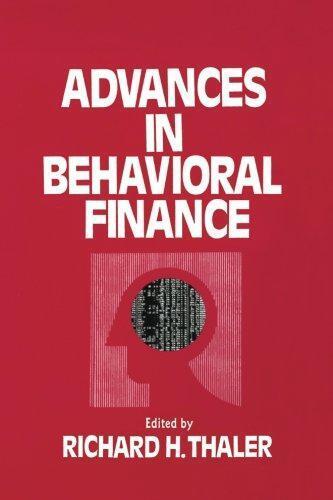Go back


Advances In Behavioral Finance(1st Edition)
Authors:
Richard H. Thaler

Cover Type:Hardcover
Condition:Used
In Stock
Include with your book
Free shipping: April 04, 2024Popular items with books
Access to 3 Million+ solutions
Free ✝
Ask 10 Questions from expert
200,000+ Expert answers
✝ 7 days-trial
Total Price:
$0
List Price: $73.00
Savings: $73(100%)
Book details
ISBN: 9780871548443, 9780871548443
Book publisher: Russell SAGE Foundation
Get your hands on the best-selling book Advances In Behavioral Finance 1st Edition for free. Feed your curiosity and let your imagination soar with the best stories coming out to you without hefty price tags. Browse SolutionInn to discover a treasure trove of fiction and non-fiction books where every page leads the reader to an undiscovered world. Start your literary adventure right away and also enjoy free shipping of these complimentary books to your door.
Advances In Behavioral Finance 1st Edition Summary: Modern financial markets offer the real world's best approximation to the idealized price auction market envisioned in economic theory. Nevertheless, as the increasingly exquisite and detailed financial data demonstrate, financial markets often fail to behave as they should if trading were truly dominated by the fully rational investors that populate financial theories. These markets anomalies have spawned a new approach to finance, one which as editor Richard Thaler puts it, entertains the possibility that some agents in the economy behave less than fully rationally some of the time. Advances in Behavioral Finance collects together twenty-one recent articles that illustrate the power of this approach. These papers demonstrate how specific departures from fully rational decision making by individual market agents can provide explanations of otherwise puzzling market phenomena. To take several examples, Werner De Bondt and Thaler find an explanation for superior price performance of firms with poor recent earnings histories in the tendencies of investors to overreact to recent information. Richard Roll traces the negative effects of corporate takeovers on the stock prices of the acquiring firms to the overconfidence of managers, who fail to recognize the contributions of chance to their past successes. Andrei Shleifer and Robert Vishny show how the difficulty of establishing a reliable reputation for correctly assessing the value of long term capital projects can lead investment analysis, and hence corporate managers, to focus myopically on short term returns. As a testing ground for assessing the empirical accuracy of behavioral theories, the successful studies in this landmark collection reach beyond the world of finance to suggest, very powerfully, the importance of pursuing behavioral approaches to other areas of economic life. Advances in Behavioral Finance is a solid beachhead for behavioral work in the financial arena and a clear promise of wider application for behavioral economics in the future.
Customers also bought these books
Frequently Bought Together
Top Reviews for Books
Rhea Basemore
( 5 )
"Delivery was considerably fast, and the book I received was in a good condition."










